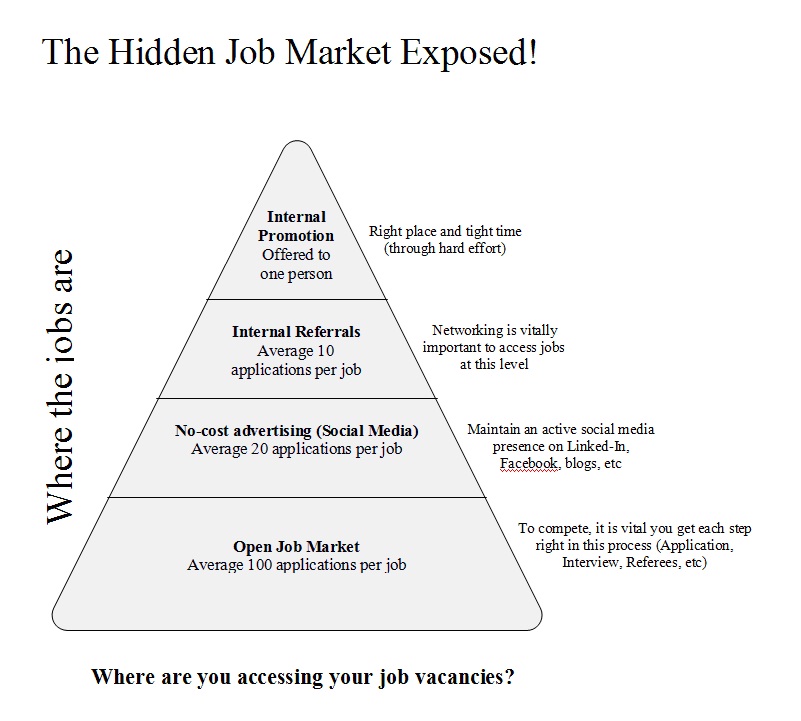Wednesday, August 14, 2013
Hidden Jobs
Most jobs getting filled these days aren’t even advertised. Instead, they’re typically part of the hidden job market, millions of openings that never get formally posted. It is estimated that these positions account for up to 80% of hires.
Most employers prefer to fill positions without advertising. It saves money and time. Managers who do the hiring often believe the most suitable candidates are people who already work for their firms and referrals from staffers. The only way to gain access to this hidden market is about connections.
(note: I rewrote the following)
6 Ways to Find Hidden Jobs from Nancy Collamer
Here are six smart strategies to help you find out about “hidden jobs” by improving your networking skills, leveraging technology and expanding your reach.
1. Change the way you network If you want to crack the hidden job market, you’ve got to be smarter about the way you connect with people with inside knowledge about unposted openings.
First, make networking a habit, not something you do only when you need a job. By including this practice in your normal routine, you’ll automatically increase your chances of hearing about opportunities. So make a point of staying in regular touch with former colleagues and always adding new LinkedIn connections.
Second, remember the cardinal rule of networking: Give before you get. Forward articles you think could be helpful to people you know and pass on job leads you’ve heard about. Networking is about building genuine relationships, not asking for favors.
Finally, make it easy for people to help you find a job. When you’re talking to contacts who might be valuable for your search, tell them about the kinds of positions you’re looking for and the employers or fields that interest you. Then follow up with emails so they’ll have handy takeaways summarizing what you discussed.
End your networking conversations by asking: “Who else should I be talking to?” That question will, in turn, lead to introductions.
2. Join a professional networking group Your fellow job seekers can sometimes be the best resources for learning about employers who are likely to hire. Most are eager to share their knowledge, knowing that others in the same boat will share in return.
3. Contact employers directly I’m continually amazed by how rarely people reach out to people at places they’d like to work unless they see positions advertised there.
I know it takes effort to craft a compelling request for an interview. But smart managers are always interested in meeting professionals who can help their employers make or save money. So figure out who the hiring manager is and be bold. Email or call to introduce yourself and explain how your background and experience would be useful there. This way, even if the place currently has a hiring freeze, you’ll be top of mind when positions do open up.
4. Sign up for Google News Alerts One of the best ways to learn about hidden jobs is to stay up-to-date with prospective employers. This way, you’ll be among the first to know when one, say, leases additional office space, signs a big partnership deal or receives a new round of funding — all signs that the firm or nonprofit might soon be hiring.
Google News Alerts make it easy to do this. Just go to the Google Alerts page and type in which employers, decision makers and fields of interest you want to hear about. Then you’ll start receiving emails with the latest news Google has turned up.
5. Attend a conference Trade shows and conventions are ideal places to mine the hidden job market. They’ll let you make new contacts who can tell you about unposted openings, help you get interviews, provide access to influencers with hiring power and discover employers in growth mode who are likely to be looking for staffers soon. You may be able to reduce or even eliminate the cost of attending a conference by offering to work there as a volunteer.
6. Finally, if you like your current employer but not your particular job, snoop around at work There could be a terrific opportunity in another department. Remember: Internal candidates often get preference over outside applicants when positions need filling.
Subscribe to:
Post Comments (Atom)



No comments:
Post a Comment